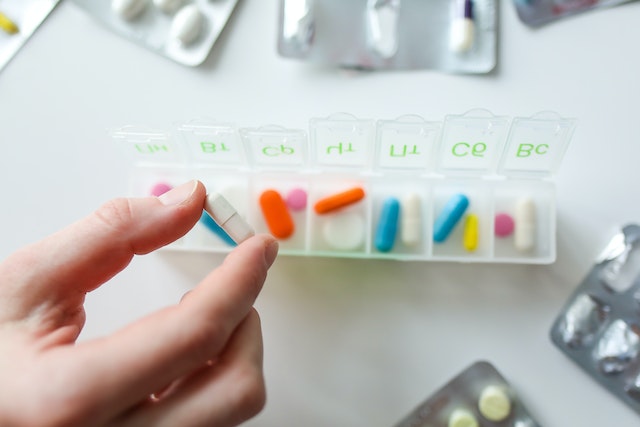Obesity has become a global epidemic. A report by World Obesity Federation recently released an alarming fact that by 2035, more than half the earth’s population will be overweight or obese.
This is extremely worrying, especially because obesity comes with many co-morbidities. These health conditions can also significantly raise the cost to society.
So, what is it that you can do?
How do you lose weight if you are obese or overweight?
For most people (under the BMI index of 25), losing weight is all about following a diet and exercise routine. But when it comes to overweight or obese people, this becomes a different ball game altogether. Thankfully, various weight loss medications on the market can help.
The science behind these weight loss pills is that they work:
- By reducing your appetite. This means you feel fuller even with lesser calories.
- Reducing your body’s capability to absorb fat, for example, orlistat.
- And some affect both your satiety and appetite.
Interestingly, these weight loss medications can lead to a 10-15% weight loss, which can help with health conditions like diabetes and high blood pressure.
The Role of Weight Loss Pills in Obesity

Diet pills, or anti-obesity medications, play a significant role in a balanced diet plan for individuals aiming to lose weight. While a nutritious, healthy diet and regular physical activity are encouraged – these weight loss medications provide ample support for those who are obese or overweight and suffer from one form of comorbidity like PCOS, diabetes, high blood pressure, etc.
Any weight loss pill targets specific aspects of your body’s biology to influence your weight. Some prescription weight loss medications can help address the biological factors that impact your weight.
Appetite Suppressants
Some weight loss tablets work by reducing appetite, helping individuals consume fewer calories.
Imagine your brain as the control centre for your hunger. An appetite suppressant weight loss pill works like a helpful messenger that tells your brain you’re not as hungry as you might feel.
They do this by sending signals that reduce your craving for food, making it easier to resist unnecessary snacking or eating large portions. This is like having a “full” sign switched on earlier so you don’t feel the urge to eat more than your body needs.
Metabolism Boosters
Certain weight loss pills aim to increase the body’s metabolic rate, which is the rate at which your body burns calories.
For example, think of your metabolism as your body’s energy burner. Metabolism-boosting weight loss tablets act as a boost for this burner.
They help your body use up more calories, even when inactive. It’s like putting extra logs on a fire to make it burn brighter and use more wood. This can help you use up more of the calories you eat, which is a big help for losing weight.
Blood Sugar Regulators
Some weight loss drugs work by regulating blood sugar levels, which can help control appetite and prevent overeating. Usually, your blood sugar levels are on a roller coaster ride. When they go up too fast, you might feel a sudden burst of energy followed by a crash.
Blood sugar-regulating weight loss tablets help even out this roller coaster. They keep your blood sugar levels from spiking too high and crashing too low. This helps you avoid those intense cravings for sugary snacks that often come after a blood sugar crash. It’s like making sure your energy stays steady throughout the day.
Fat Absorption Inhibitors
These medications block the absorption of dietary fats in the digestive system. In layman’s terms, imagine your digestive system as a sponge that soaks up everything you eat. Fat absorption inhibitor fat loss tablets work like a cover for this sponge, stopping it from soaking up too much fat.
When your body absorbs less fat from your food, fewer calories from fat are added to your body’s calorie count. It’s like having a guard at the sponge’s door, ensuring it doesn’t soak up as much fat as usual.
Now that we know how weight loss medications work, it is time to understand how to incorporate these tablets for weight loss.
Some of the weight loss pills that work and that are available in India are:
- Ozempic
- Orlistat
- Liraglutide
- Wegovy and others.
Please note that it is best to consult a doctor or an obesity specialist before taking fat burner tablets.
Incorporating Weight Loss Tablets into Your Daily Routine

Shedding those extra kilos frequently demands a fusion of adopting nutritious dietary patterns, engaging in consistent physical activity, and occasionally seeking extra support from the common weight loss tablets.
If you’re considering incorporating prescription anti-obesity pills into your exercise routine, it’s important to understand the medical aspects and the overall process.
Consultation with a Healthcare Professional
Before integrating weight loss pills into your exercise regimen, it’s necessary to undergo an extensive discussion with a certified medical expert. This might involve consulting a licensed doctor, an endocrinology specialist, or a registered dietitian.
Also, this particular stage holds immense importance as it guarantees that the weight loss tablet you opt for is specifically customised to your unique medical background. This involves factoring in elements like your present state of health, medical history, prevailing ailments, and plausible clashes with other medications.
Medical History Evaluation: During this consultation, your healthcare provider will delve into your medical history, paying close attention to factors such as metabolic disorders, hormonal imbalances, cardiovascular health, and any history of allergies or sensitivities.
Drug Interaction Assessment: The healthcare professional will assess any ongoing medications you might be taking to avoid potential interactions with weight loss drugs. These interactions could impact the tablet’s and the medication’s efficacy or safety.
Personalised Tablet Selection by an Obesity Specialist
Selecting a weight loss tablet best suited to your physiology involves a nuanced evaluation by your doctor. This selection is guided by understanding how the tablet’s mechanism aligns with your body’s metabolic intricacies.
Targeted Mechanisms: A tablet that addresses this issue by enhancing insulin sensitivity might be recommended if you have insulin resistance. On the other hand, if your weight gain is related to disruptions in adiponectin levels, a tablet aimed at modulating this hormone might be more suitable for long-term use.
Dosage Considerations: Based on your health profile, the healthcare provider will determine the appropriate dosage of the selected tablet, ensuring it falls within safe and effective ranges.
Synchronising Tablets with Exercise
Blending prescription weight loss tablets with exercise requires strategic planning to optimise outcomes while minimising potential risks.
Metabolic Synergy: Exercise can enhance insulin sensitivity, stimulate fat oxidation, and promote lean muscle mass development, all of which can augment the effects of weight loss drugs. This synergy between exercise and tablets is essential for achieving long-term use success.
Cardiovascular Health: Aerobic exercises, such as jogging, brisk walking, and cycling, improve cardiovascular fitness, which is crucial for overall well-being. When paired with anti-obesity medication, these exercises offer a comprehensive approach to enhancing overall well-being.
Monitoring and Adjustments
Integrating weight loss pills and exercise necessitates vigilant monitoring and proactive adjustments.
Tracking Parameters: Consistently keep track of alterations in body weight, levels of vitality, and any possible adverse reactions associated with the weight loss medication. This information offers vital insight into how your body reacts to the intervention.
Involvement with Healthcare Professionals: Sustain transparent communication with your medical specialist. Sharing updates about your advancement and encounters enables them to make well-informed choices concerning potential modifications to your medication schedule or exercise plan.
Strategies for Long-Term Success of Weight Loss Tablets
Although the initial fusion of weight loss pills and physical activity holds significance, upholding advancements over an extended period necessitates a tactical outlook.
Gradual Reduction: As you accomplish your weight loss objectives, your medical professional might propose a progressive decrease in the dosage of weight loss drugs. This gradual method aids your body in naturally acclimating to the modifications.
Continual Assessment: Regular follow-ups with your medical practitioner enable continuous assessment of your advancements and health indicators. This evaluation steers any requisite modifications to your workout regimen, dietary preferences, and tablet plan.
Addressing Concerns: Safety and Effectiveness of Weight Loss Tablets

When it comes to weight loss, many people consider using weight loss medication as a potential solution. However, it’s crucial to address the concerns regarding the safety and effectiveness of these tablets before using any fat-loss tablets.
Safety of Weight Loss Tablets
Safety is paramount, and it’s natural to be cautious about introducing any new substance into your body. Weight loss tablets can often vary widely in their ingredients and mechanisms. Some contain natural extracts, while others have synthetic compounds.
Ingredients: It is imperative to meticulously examine the constituents of any weight loss supplement under your consideration. Opt for established brands that openly divulge the components they employ.
Side Effects of Weight Loss Medications: Like any medication aimed at helping you to feel better, weight loss supplements can entail potential side effects. These encompass gastrointestinal disturbances, elevated heart rate, restlessness, and more. Individuals with pre-existing medical conditions, such as cardiac ailments or hypertension, should proceed cautiously and seek counsel from a healthcare specialist before using such products. Unlike weight loss supplements, like green coffee bean, there can be some common side effects of the medicine.
FDA Authorization: Verify whether the weight loss supplement has gained endorsement from the Food and Drug Administration (FDA) or pertinent regulatory bodies in your jurisdiction. Such approval underscores the product’s rigorous evaluation concerning both safety and efficacy.
Effectiveness
Each medicine comes with its effectiveness that depends on your biology and metabolism. However, weight loss pills are 10-15% more effective when losing weight.
Weight loss pills work on the mechanisms that involve appetite suppressants or satiety fillers. Some also work to absorb fat. However, these weight loss pills are not weight loss supplements. They are only prescribed when you are obese or overweight and have a preexisting condition like PCOS, diabetes or high blood pressure.
However, weight loss pills are not miracle drugs. They only exhibit optimal outcomes with a wholesome diet, regular physical activity, and regular intake of the prescribed medicines.
Quick Tips for Medical Weight Loss
Consult a Healthcare Professional: Before incorporating any weight loss tablets into your routine, it’s crucial to consult a healthcare professional. They can guide you on whether these tablets are appropriate for you, given your medical history, current health condition, the types of medication you can take, its potential side effects, etc.
Follow Dosage Instructions: Always follow the recommended dosage instructions for prescription weight loss drugs your healthcare provider provides. Taking more than the prescribed amount won’t necessarily speed up your weight loss and might have adverse side effects on your health. These medications are designed to help you sustainably lose weight, but using weight loss drugs as a quick fix is not the solution.
Maintain a Healthy Diet: Prescription-based fat burner tables can help you lose weight, but you must also maintain and follow a healthy diet. The diest will help you to maintain your body fat to muscle ratio and achieve your weight loss goals faster. Incorporate plenty of fruits, vegetables, lean proteins, healthy beverages such as coconut water or green tea, whole grains and healthy fats to maximise the fat-burning process.
Stay Hydrated: Drinking enough water is essential for overall health and can support the effectiveness of the weight loss pill. Aim to drink plenty of water throughout the day. You can also replace water with green tea, coconut water, ginger tea, etc., to stay hydrated during your weight loss journey.
Have a Regular Exercise Schedule: Incorporate regular physical activity into your routine. Exercise helps with weight loss and improves your overall fitness and well-being.
Consistency is Key: Take your weight loss pill at the same time each day to maintain consistency. This can help ensure you get the most out of the medication. Unlike weight loss supplements such as garcinia cambogia, and green coffee bean, it’s best to follow a routine on a medical weight loss journey.
Monitor Progress: Keep track of your weight loss progress and any changes you notice while taking the tablets. This information can be useful when discussing your results with your healthcare provider.
Be Patient: Weight loss is a gradual process, and results may not be immediate. Don’t get discouraged if you don’t see significant changes right away.
Address Side Effects: Some weight loss tablets may have side effects. If you experience any adverse reactions, consult your healthcare provider immediately. They can advise you on whether to continue or adjust your dosage.
Avoid Self-Medication: Don’t rely solely on weight loss tablets. They should be part of a comprehensive weight loss plan that includes healthy eating, exercise, and lifestyle changes.
Regular Check-ins: Schedule regular follow-up appointments with your healthcare provider to monitor your progress, address concerns, and adjust your weight loss plan.
Why should you consider Elevate Now?
Elevate Now is a multidisciplinary weight loss program by obesity specialist doctors, dieticians, and trainers. We customise diet and workout plans based on your body assessment and health history.
What makes us unique is that we help lose weight by resetting metabolic setpoints. It is a defined range of weight that our body tries to maintain. So, when you start to change your lifestyle to lose weight, it resists your efforts.

Weight loss is not only limited to diet and physical exercise; it also depends upon scientific mechanisms like metabolism setpoint. Elevate Now helps in changing your metabolic setpoint to avoid weight rebound.
Our obesity specialist doctors suggest fast weight loss medicines that are best for your body based on your health status. The health coaches are available around the clock to motivate you throughout the journey.
Once you register with Elevate Now, you won’t have to worry about gaining your weight back, as it is the permanent solution to your weight loss problems. You can kickstart your weight loss journey by registering with Elevate Now.
With Elevate Now, you can end your weight rebound worries as living a healthy life is no longer a far-fetched dream. Enrol today to kickstart your weight loss journey.
Final Thoughts on Weight Loss Pills
Choosing the right tablets can make a difference in your journey when you’re on a mission to shed those extra pounds effectively. So, here’s the deal: think about stuff like what’s in those tablets, what science has to say, whether there could be any not-so-great effects, and what your own health goals are.
Bottom line? There’s no one-size-fits-all fix here. Hence, it’s smart to chat with a healthcare professional before you dive into any weight loss plan. Your path to becoming healthier starts with making well-informed choices and committing to changes that stick around. Here’s to your success and a brighter, healthier future ahead!
Frequently Asked Questions about Weight Loss Tablets
Weight loss is a journey that can be achieved through exercise and diet, but sometimes a little extra support is needed. Weight loss pills, including GLP-1 agonists, orlistat, and semaglutide, offer a promising solution for those moments. Combined with continued lifestyle changes, these prescription medications can contribute to long-term success, opening a path to achieving your health goals.
Weight loss pills need to be prescribed by a medical professional who is an expert in obesity. Only with proper diagnoses are these medicines given.




